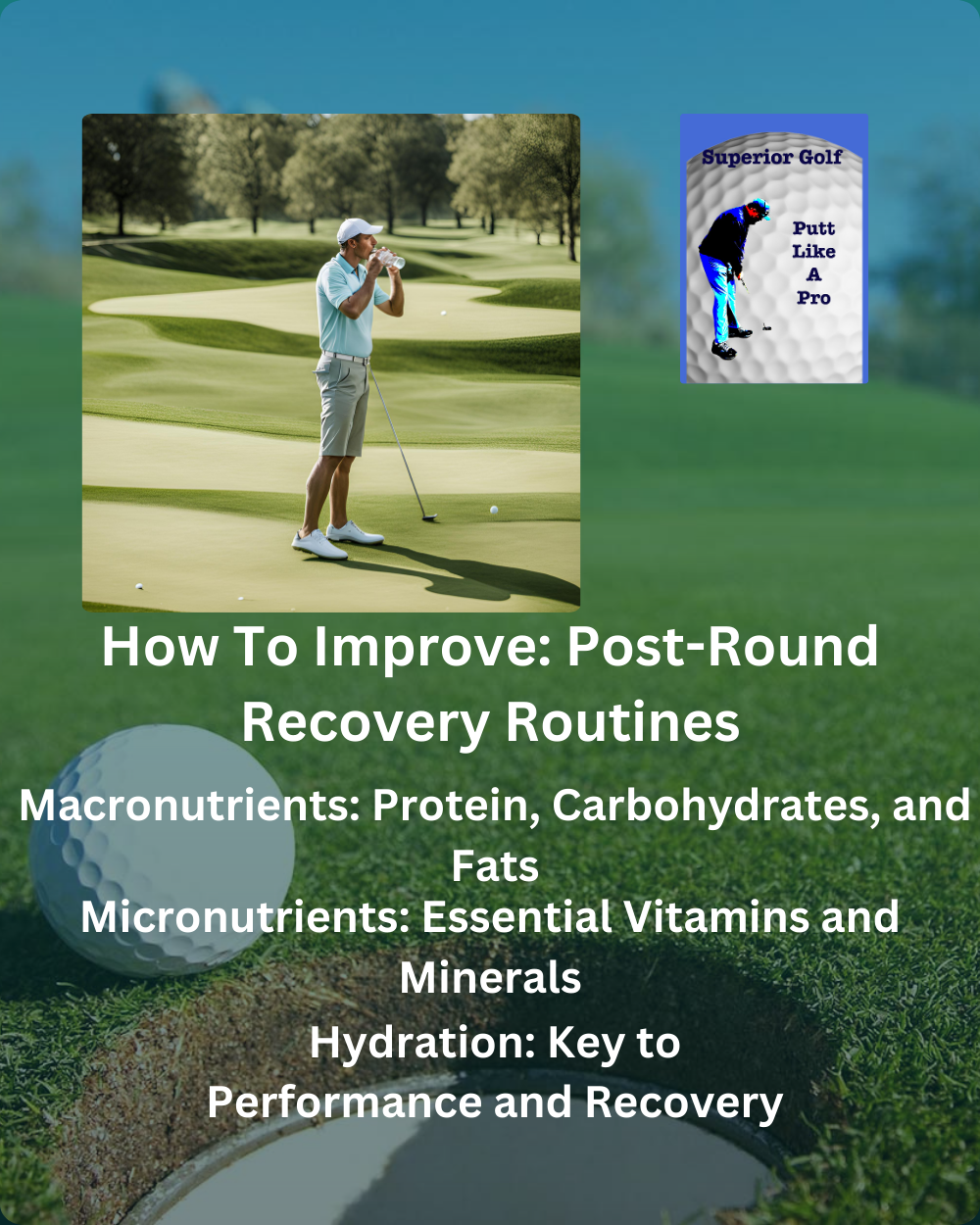Post-Round Recovery Routines: Ever felt your muscles aching after a round of golf? It’s not just a simple game. Golf challenges you physically and mentally, burning around 700 calories and stretching over 6700 yards. This sport demands a lot from your body. A full-speed swing can put a huge force on your spine, like carrying six times your weight. But, there’s good news. With the right recovery routines, you can lessen these effects, boost your game, and enjoy golf more. Whether you’re looking up to pros like Justin Rose with their fancy recovery gadgets or just an amateur trying your best, knowing how to recover is key.
Key Takeaways
- The physical and cognitive demands of golf necessitate a comprehensive post-round recovery routine.
- A typical round of golf burns about 700 calories, highlighting the need for energy replenishment1.
- Proper protein intake, at least 1.2 grams per kilogram of body weight daily, is essential for muscle repair post-round1.
- Hydration plays a critical role in sustaining performance and effective recovery12.
- Employing a combination of stretching, therapeutic exercises, and mental relaxation techniques ensures holistic recovery.
The Importance of Nutrition in Post-round Recovery
Proper nutrition greatly affects how well you recover after a round. It’s all about eating the right foods and staying hydrated. Doing this can improve your game and speed up recovery.
Macronutrients: Protein, Carbohydrates, and Fats
Macronutrients play a huge role in your recovery. Proteins fix muscles and should be eaten 30 to 60 minutes after playing. They kickstart protein synthesis3. A good recovery snack mixes 20 grams of protein with 30 grams of carbs. This combo repairs muscles and refills energy3. Go for lean proteins like chicken or tofu. They’re packed with amino acids that help muscle comeback3. Omega-3 fats lessen inflammation and boost repair. Balance your carbs to keep your energy steady during games.
Micronutrients: Essential Vitamins and Minerals
Micronutrients are key for sports nutrition and getting back on your feet. Leafy greens, berries, and yogurt boost immune function and mend tissues after exertion3. Supplements like caffeine and creatine may also enhance your performance and muscle growth. Getting enough vitamins and minerals is crucial for top-notch recovery and game play.
Hydration: Key to Performance and Recovery
Staying hydrated is crucial for recovery. Being even a bit dehydrated can mess up your game. It’s vital to drink up after a workout to replace what you’ve lost3. Try sports drinks or coconut water to keep your hydration level just right. They help you stay hydrated and keep up your performance. It’s important to continuously drink fluids and electrolytes to aid recovery and health.
| Macronutrient | Recommended Intake | Benefits | Sources |
|---|---|---|---|
| Protein | 20-30 grams post-round | Muscle repair and growth | Chicken, fish, tofu, Greek yogurt |
| Carbohydrates | 30 grams post-round | Glycogen replenishment | Quinoa, sweet potatoes, fruits |
| Fats | Omega-3 rich foods | Inflammation reduction | Salmon, chia seeds, flaxseeds |
Effective Post-round Recovery Routines
Recovery routines after golf are key to getting better at the game. Adding stretches, exercises for therapy, and techniques for mental recovery can really improve your golf skills and health. Here’s what makes up a good recovery plan.
Stretching: Essential Post-round Stresses for Golfers
Stretching eases muscle tightness post-game. The standing quad stretch and seated spinal twist are very good. They help with the common soreness 67% of golfers feel after playing2. By doing these stretches, you become more flexible and bounce back faster.
Therapeutic Exercises for Recovery
Exercises for healing are a must for full recovery after golf. Using foam rollers, which 52% of golfers do for relaxing muscles, is great for self-massage2. Hip flexibility workouts lessen stiffness and aches, important for players4. Also, 39% of people find exercise like squats and core strengthening crucial in their recovery plans2. Walking through the phases of acute, sub-acute, and chronic rehab greatly helps in getting better.
Mental Recovery: Visualization and Relaxation Techniques
Recovering mentally is just as crucial. Visualization and relaxation help your mind, which is vital for golf. Reflecting on the good points of your game after playing, also known as psychological debriefing, is recommended by many4. These techniques lower stress and aid in mental recovery.
For extra tips on golfer recovery methods, check out this forum discussion and expert advice on golf fitness with Brent Davis.
Conclusion
To really get better at golf, it’s key to have a good post-round recovery routine. It’s not just about practicing your swing. It also involves eating right, doing exercises, and working on your mental game. Each part is essential for boosting your performance and recovery.
Drinking enough water right after you play is super important. You need to drink 150% of the weight you lost while playing, within 45 minutes5. This step helps replace lost fluids and keeps you ready for the next game. Eating the right foods, especially proteins, is crucial too. Getting 21 to 37 grams of protein after your round can make you feel less sore and more energized5. Also, protein helps you recover faster and reduces tiredness and muscle pain5.
Doing things like foam rolling helps a lot with muscle soreness. It also makes your muscles work better and increases flexibility5. Mental recovery, like imagining your plays or relaxing, is just as important. It keeps your brain sharp. Techniques like breathing through your nose can relax you and make your brain work better during recovery5.
In the end, taking care of all aspects of recovery is vital for golfers who want to play better and for longer. Paying attention to these recovery methods will improve your physical shape, prevent injuries, and up your golf game. They offer a full plan for bettering your golf routine and strategies. For extra tips on making the most of these methods, check out this guide on post-race recovery from TrainingPeaks.
FAQ
What is the importance of post-round recovery routines in golf?
How does nutrition impact post-round recovery for golfers?
What types of golf fitness exercises should be included in a recovery routine?
Why is hydration important during and after a round of golf?
What are some effective therapeutic exercises for golfers?
How do mental recovery techniques benefit a golfer’s performance?
What is the recommended protein intake post-round for golfers?
How many calories does an average round of golf burn?
Source Links
- https://www.kineticasports.com/blogs/top-tips/post-round-recovery-nourishing-your-body-after-a-day-on-the-course
- https://forum.practical-golf.com/t/post-round-recovery/602
- https://bellinghamevo.com/what-is-the-best-thing-to-eat-after-a-workout-tips-for-maximized-results/
- https://mikefaygolf.com/better-golf-fitness-with-brent-davis-recovery-strategies/
- https://www.trainingpeaks.com/blog/post-race-recovery-tips/

